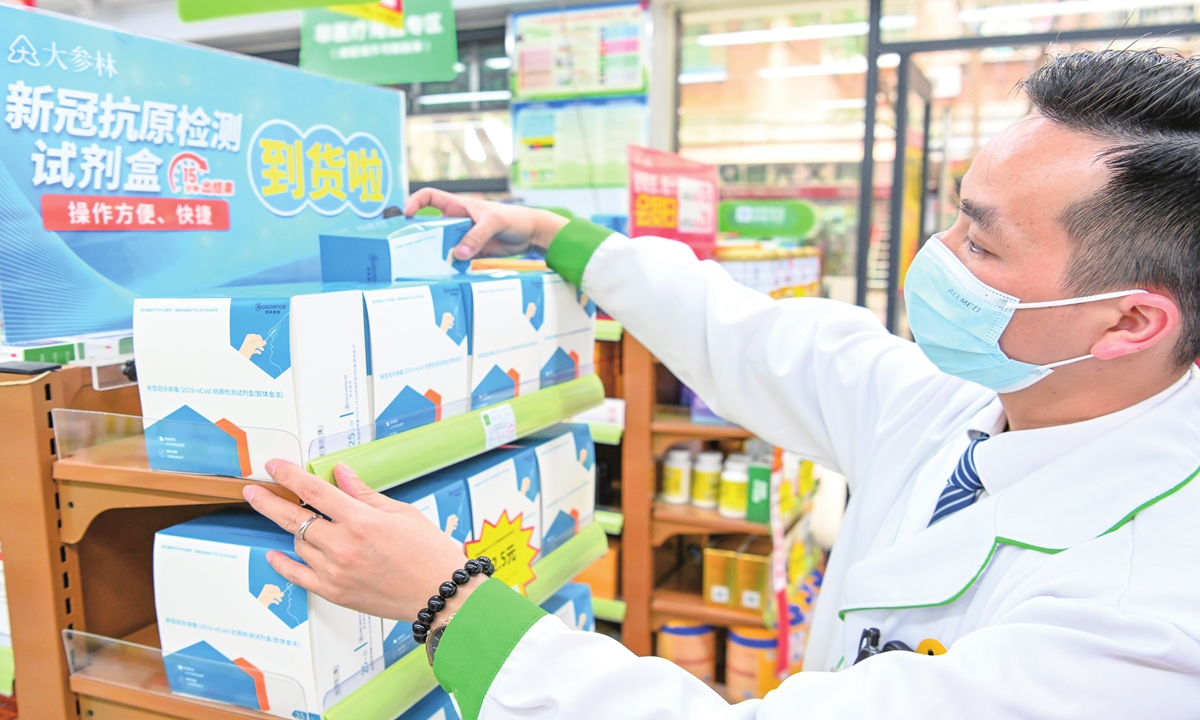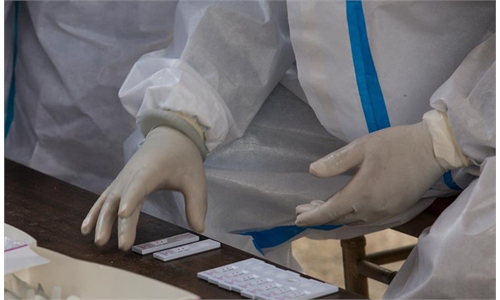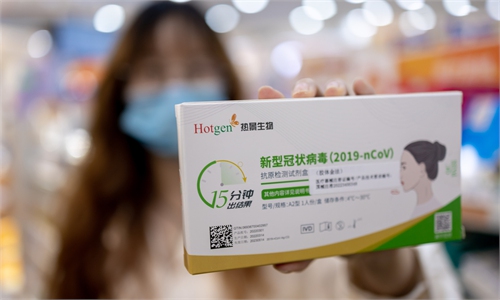China’s antigen test kit suppliers gear up to meet surging demand amid epidemic flare-up

A pharmacy staffer arranges antigen test kits on March 22 in Guangzhou, South China's Guangdong. Photo:VCG
Industry groups and producers are ramping up efforts to ensure the adequate supply of antigen test kits that have seen spiking demand amid ongoing epidemic flare-ups across several cities and provinces.
Currently the 17 companies that have already gained a license to retail antigen test products in the domestic market are working around the clock to deliver inventory as well as looking for production upgrades, while other suppliers that have already received FDA or CE markings are also applying for the domestic market approval, the Global Times has learned.
Several antigen test kit producers are working at full capacity to supply the test kits, with some planning to upgrade production lines, in response to ballooning demand.
In response to the demand, BGI Group is ramping up efforts to ensure an adequate supply of test kits, while adjusting their production plan in accordance with the market landscape, the company told the Global Times in a recent interview.
On March 11, the joint prevention and control mechanism of the State Council, the cabinet, issued a notice, announcing for the first time the addition of antigen detection as a supplement on the basis of a nucleic acid test. People who have self-testing demand can access antigen test products via online stores and other channels, according to the notice.
The antigen test effectively reduces potential risks for cross-infection, especially when crowds are taking nucleic acid tests in a confined designated place, while saving the extra costs of time and labor, experts have said.
As of March 18, the National Medical Products Administration (NMPA) had approved 17 coronavirus antigen detection reagent producers since the first five licensed companies were announced on March 12.
Supply pipeline
But the current amount is still not enough to cover the demand with the expectation that the need for these tests will continue to rise.
With reference to overseas distribution policies, it is estimated that the monthly scale of the domestic COVID-19 antigen self-test kit market is expected to reach 17.7-26.6 billion yuan ($2.78- 4.17 billion), according to media reports.
Several test kit suppliers told the Global Times on Wednesday that they are already engaged in the application process for domestic market use.
A major test kit producer based in Central China's Hunan Province told the Global Times on Wednesday that they are applying for a license that will allow them to sell antigen products in the domestic market.
With the company holding CE marking and having already sold its products to many countries in Europe and elsewhere, the application is expected to be simplified or quicker, industry insiders said.
According to a recent trial notice issued by the medical device technical evaluation center under the NMPA, if the overseas clinical data for antigen test kits is operated according to regulatory standards and completed in a laboratory with strict requirements, then such data can also be acceptable for domestic application, according to Securities Times on Wednesday.
"The current domestic production capacity of antigen test kits is not fully unleashed, which is why allowing those with FDA or CE markings to be able to sell their test products in the domestic market is part of the consideration," Bai Yu, president of the Medical Appliances Branch of the China Medical Pharmaceutical Material Association (CMPMA), told the Global Times on Wednesday.
At present, nearly 500 COVID-19 testing products from more than 100 enterprises in East China's Zhejiang Province have been approved for sale in the US, the EU and other countries and regions, according to public information and reported by a number of media outlets.
In terms of antigen testing, a total of 18 companies in Zhejiang have their antigen testing products included in the "white list" for export. But as of now, only three local antigen detection reagent producers have obtained domestic license, and other companies are still waiting in line, the report said.
Industry insiders have noted that with more test companies on the approval list and the domestic sporadic outbreaks reined under the strict preventative measures, supply and demand should become reasonably well balanced.
Such a trend has already been reflected by moves to relax purchase limits at some online stores.
One large online pharmaceutical store at Tmall.com said that customers can now buy five packages of antigen test kits per account instead of just two when the products were firstly launched on the shelf about a week ago.
"The antigen test kits are adequate but we still adopt purchase limit just to ensure more people can get them," the customer service of the store said.
Other online drug stores that the Global Times reached on Wednesday said that they are also relaxing purchase limits.
With more supplies and government efforts in place, the price for antigen test kit is also expected to drop significantly, insiders said.
The current market retail price at some cities is uneven, with an average of around 25 yuan, but the current provincial-level procurement price is between 7.9-9.8 yuan - such a price inversion is very serious, Bai said.
But as supply is ramped up, prices will further fall, Bai said, noting that local drug administrators are also actively monitoring prices.
Antigen testing has been available since the outbreak of the epidemic in 2020, but Chinese products have always been sold to foreign countries instead of being sold domestically in the light of the different epidemic prevention policies between China and some other overseas countries.
Although the domestic supply is currently tight and some manufacturers are struggling under the weight of large order numbers, some believe that it is a short-term phenomenon, and the follow-up demand will become more sustainable.
While China represents a large market for antigen tests kits, tests will still need to be adopted in parallel with nucleic acid test - while the former can only be used for primary screening, a nucleic acid test is still required for diagnosis due to its higher accuracy.
Li Jinming, deputy director of the National Health Commission's Clinical Laboratory Center, told a press conference on March 15 that the specificity of quality antigen detection reagents can reach 99 percent, but the specificity of nucleic acid detection method is 100 percent - therefore, nucleic acid testing has always been the basis for determining the infection, according to media reports.


